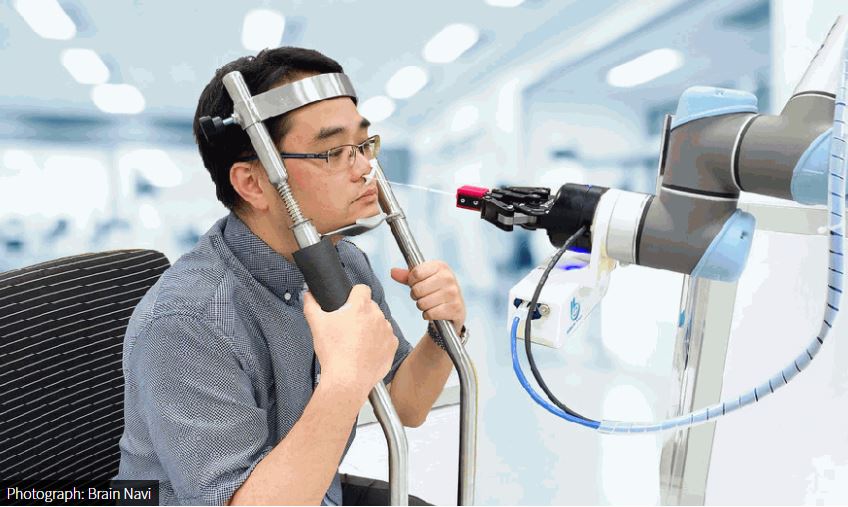Taiwan’s Brain Navi builds a robot for nasal swab tests amid COVID-19

With COVID-19 sweeping the world, governments have ramped up testing to contain local transmission and prevent new infections.
To healthcare workers, this means they need to be in close contact with more potential cases of the virus, risking being infected.
In light of this, Taiwan’s biotech company Brain Navi has developed a robot which can perform nasal swab tests autonomously. It takes just two to five minutes to get the results.
A prototype was sent for clinical trials and approval in Taiwan and the US in May, and Brain Navi debuted the product at Bio Asia-Taiwan 2020 in July.

“In Taiwan, it usually takes about 20 to 30 minutes to perform a nasal swab test. Many medical workers decide not to go to the toilet for four hours just to avoid putting on and taking off their heavy hazmat suits,” said Jerry Chen, Brain Navi’s founder and CEO.
The robot locates a person’s nostril, inserts a long swab into it, collects the fluid, and transfers it into a closed container. All the work is done without human assistance.
Even though medical workers still need to get close to help positioning the patient into a head holder, they can later supervise the entire procedure at ease behind a transparent panel.
Brain Navi’s robot also prevents medical workers from causing discomfort to their patients. Instead of deciding how far to insert the swab based on experience, they can simply rely on the robot, which scans the patients’ facial structure to locate the exact spot to collect the fluid.
Chen added the positioning error of the robot is smaller than 2mm.
This new device is based on several fundamental functions of Brain Navi’s previous neurosurgical navigation robot NaoTrac. Combining the use of machine vision, AI, and robotic techniques, it’s an autopilot brain surgical robot that tracks anatomical locations and handles instructments accurately. It has successfully performed 15 human trial cases in Taiwan.

“Long operation time and high demand of concentration have consumed a lot of physical stamina of the surgeon and affect the surgeon’s performance,” Chen told Medgadget at the launch of NaoTrac.
“Our device can act like an assistant for the surgeon which can help the surgeon standardize the operation and provide a higher degree of accuracy throughout the surgery.”
Founded in 2015, Brain Navi aims to help neurosurgeons improve precision, eliminate risk of surgical complications, and ultimately reduce their workload by streamlining medical procedures through their products.
Chen, a former surgeon, has an extensive background in medicine and biomedical engineering and an avid interest in finding solutions for modern problems.
“I like to invent something to improve medical processes. I am the kind of person that is not satisfied by current solutions,” Chen said.
“We’re looking to global markets. We have very strong technologies. We have the devices. We are looking for connections and investors all around the world so we can expand outside of Taiwan.”
〔Original :Meet Startup @ TW〕
https://meet.bnext.com.tw/intl/articles/view/46816